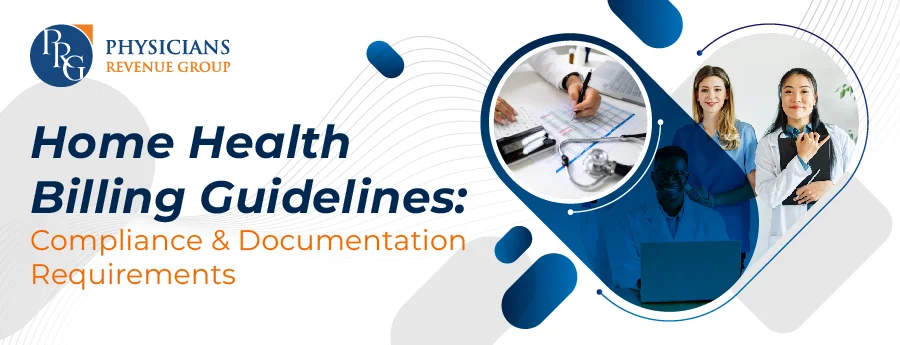
Email: info@prgmd.com | Call: +1 (630) 242-6474
Business hours: 9:00 to 5:00 | Monday to Friday
Email: info@prgmd.com | Call: +1 (630) 242-6474
Business hours: 9:00 to 5:00 | Monday to Friday

Table of Contents
ToggleIf it’s not written, it didn’t happen – this quote perfectly fits the medical records and the clinical documentation. Moreover, this can also include consistency, quality, and clarity. Complete, comprehensive, consistent documentation is vital for smooth home health billing services. Enhancing the quality of clinical documentation meaningfully improves the quality of care and patient satisfaction levels. All of this while reducing the risks of compliance issues, as such issues during the survey can cause delays or reductions in reimbursements.
There is a massive $5.3 billion decrease in the estimated erroneous payments for home health medical billing services over the last few years. According to a 2018 report, the potential improper payment amount for home health medical billing services was $3.2 billion. It loosely translates into a Medicare FFS (Fee-For-Service) improper payment rate of 17.6 percent. Which is over 9.8 percent of the total Medicare improper payment rate for 2018.
The Medicare coverage of home health services calls for physician certification for a patient’s eligibility. Let’s dive into some of the most essential tips and requirements for preventing denials of home health billing services.
First and foremost, it is vital to address the inadequate documentation for the certifications of eligibility, making sure that Medicare and doctors give access to NPPs (non-physician practitioners) to warrant that a patient is:
Now let’s go into detail regarding every certification requirement:
The primary and most important aspect of home health qualification is that the patient is confined or limited to their home. In Medicare jargon, it is explained as when a person is suffering from a condition that makes it difficult for them to leave their residence. This can also be due to needing special medical equipment, such as an oxygen tank, wheelchair, and crutches, in addition to other similar requirements.
Similarly, patients suffering from a taxing medical condition, such as terminal illness, a severe disability, or any other situation when their health makes travel contraindicated. It is important to note that infrequent travel to specifically one-time events like religious services, funerals, and everyday errands are not disqualifiers for the home confinement guidelines.
To be eligible for home health care, the patients must also require skilled services. Medicare guidelines state that there should be a documented requirement for nursing care for 8 hours a day or even a particular service like a therapist, speech-language pathologist, or similar service providers. In addition to this, the requested services must follow basic home health billing guidelines and be reasonable. Both of these factors are important for the recommended number of visits.
Proper documentation is important for home health billing services for Medicare. For claim reimbursement, complete evidence must be present in a patient’s medical file. That evidence must corroborate a patient’s homebound status and the reason for a doctor’s recommendation for home health services. In such cases, keeping detailed charts and notes, and any other information that can back up the need for home healthcare is highly important.
Complying with home health billing guidelines and ensuring proper documentation is essential for smooth billing services. It is important to make your medical practice HIPAA compliant for effective billing solutions, and building trustworthiness. Furthermore, comprehensive consistent documentation improves the quality of care and patient satisfaction and reduces the risks of compliance issues. Maintaining proper documentation supporting a patient’s eligibility for home health services is crucial. Also including their homebound status and the physician’s recommendation. By adhering to these guidelines, healthcare providers can prevent denials and maximize reimbursements for home health services.
The certification requirements for home health services include:
Accurate documentation ensures that all necessary information is recorded, supporting the eligibility of patients for home health services. By maintaining detailed charts and notes, healthcare providers can effectively justify the need for home health care.
Share:
Categories
Recently Added

What is a TPE Audit in Healthcare

What is an ABN in medical billing?

What does a Clearinghouse do During Claims Submission?
We Would Love to Assist You!
We treat your data confidentially and don’t share any information with a third party.